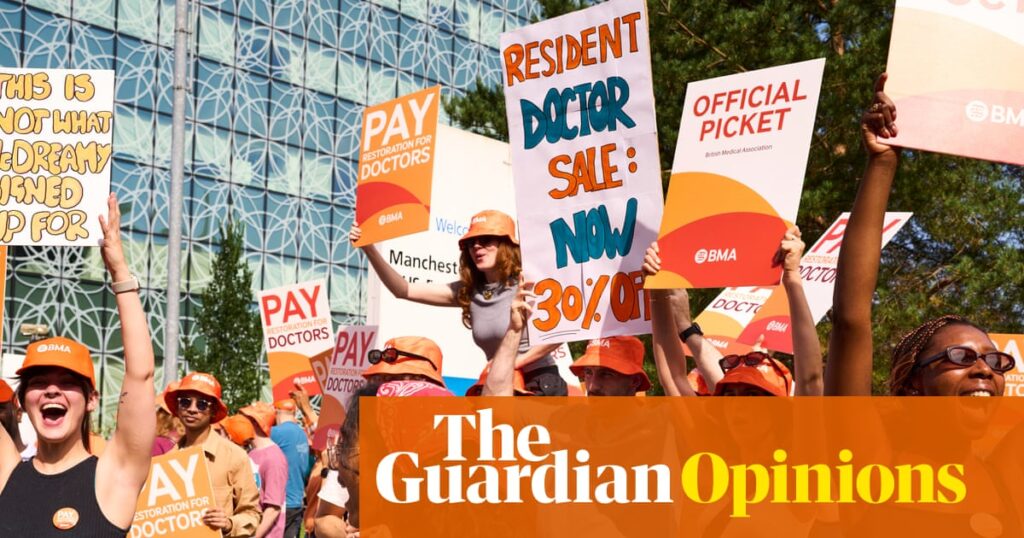As five days of strike action by resident doctors come to an end, the BMA has written asking me to return to the negotiating table. I’ve responded, with the irony of their letter being that I never left the table. We are back to where we were two weeks ago, when I sat down in good faith and offered to work intensively with them over a few weeks to negotiate a package of measures that would make a real difference in meeting the costs of doctors’ training, the costs associated with being a doctor and the lack of promotion opportunities.
The only difference between now and a fortnight ago is the damage that the BMA has done to the NHS through its reckless strike action.
Thanks to the hard work of NHS leaders and the heroic efforts of frontline staff who stepped up, including many resident doctors who showed up for work, the disruption was not as bad as it might have been. We managed to protect more operations and procedures than in previous years, and our accident and emergency response times improved during the period of strike action.
But I do not want for a moment to play down the real impact of strike action on patients. The BMA has made no bones about the fact that it wanted to do damage to the progress we are making on cutting waiting lists and waiting times, and use the suffering of patients as leverage against the government. It cannot duck the consequences of its actions now.
On Saturday, I spoke to a patient whose kidney cancer surgery has been postponed by a month until the end of August. I rang him personally to apologise because, having been through kidney cancer myself, I know exactly how it feels to wait, and the impact the fear and anxiety has on our families and close friends. It was just one of countless examples of cancer care that was affected, not to mention many other operations, appointments and procedures.
We are still counting the costs of strike action on patients and stretched NHS budgets – budgets that doctors are relying on to deliver real improvements to their working conditions, as well as to patient care.
Doctors are not the only staff I am responsible for in the NHS. The Royal College of Nursing will shortly publish a survey of its members and, without having seen the results, I have spent enough time with our nurses to know that they have not felt valued by the previous government and they are looking to Labour to deliver meaningful change to their profession. The GMB union has made similar representations on behalf of paramedics. Unite returned a negative ballot this week. Unison, the largest trade union in the country, knows better than anyone that staff right across the NHS are looking for material improvements to their pay and conditions. Many of them will never earn as much as the lowest-paid doctor. I have committed to work with them through the NHS staff council to make sure that we drive real change for their members, too.
None of them have had a pay rise of 28.9%. Only resident doctors can claim to have received the highest pay rise in the public sector two years in a row. No wonder other NHS staff have looked on aghast at the action of the BMA. The BMA’s demands, and the speed with which it launched a strike – and a five-day strike at that – have left many other NHS staff, most of them paid far less than doctors, dismayed and appalled.
The BMA is now adding jobs to its pay dispute, presumably because its members agree that picking a fight on pay after a 28.9% pay increase is unprecedented and unreasonable, and they are more worried about whether they have jobs to go into. They are right to be concerned, but working with the BMA to address doctor unemployment and career bottlenecks are among a number of things we are able and willing to do to improve the lives of doctors.
All I ask of the BMA is two things. The first is to drop this unnecessary and unreasonable rush to strike action. It harms doctors, it harms patients and it is fundamentally self-defeating, because it leaves the NHS with less money to address the issues that doctors care about. The second is to recognise that this government has a responsibility to all NHS staff and, above all, to patients. We can’t fix everything for everyone everywhere all at once.
Labour didn’t break the NHS, nor did the doctors. Patients are looking to us to work together, as a team, to get their NHS back on its feet and build an NHS fit for the future. The past 12 months has shown what this government and the NHS can achieve when we pull together. Waiting lists are at their lowest levels in two years and it feels like the NHS is finally moving in the right direction.
It should be clear to the BMA by now that it will lose a war with this government. It’s not too late for us both to win the peace.
-
Wes Streeting is secretary of state for health and social care
-
Do you have an opinion on the issues raised in this article? If you would like to submit a response of up to 300 words by email to be considered for publication in our letters section, please click here.


